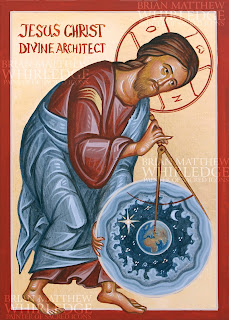Icons and Echoes
I have been drawing and making music longer than I can
remember. The visual and performing arts
have always been an integral part of my life.
Whether sculpting, singing, drawing, playing, or painting, the arts have
consumed and defined my life. I have found no more appropriate or profound way
to share the human experience than the fine arts.
When I first encountered the Eastern Orthodox Christian Church, I
was awestruck by the unapologetically prominent roles of the fine arts. Orthodox Christians see the fine arts as
essential avenues for proclaiming of the Gospel of Jesus Christ. Every service is sung in its entirety and
every square inch of an Orthodox Church building is traditionally covered with
icons. Sound and sight play prominent
and parallel roles as theological doxology is expressed by blending text with
melody to create music, while it is also expressed with line and color to
create images. This is, after all, the
Church that produced Dostoevsky, who famously proclaimed, “Beauty will save the
world.”
Upon my confirmation into the Eastern Orthodox Church, I quickly
found myself immersed in both chant and iconography. As a visual artist, it was only natural to
explore iconography. As a musician,
singing was an organic way for me to serve in the church.
Through independent study, I have achieved a practical competency
in both iconography and chant. I have
chanted in my home parish, St. Mary Orthodox Church in Goshen, Indiana for
almost five years and in August 2010, I was ordained a cantor and assumed the
role of choir director. During a 2007 one-week workshop at Holy Dormition
Orthodox Monastery in Rives Junction, Michigan, I first experienced icon
painting. Since then, I have painted
many icons. Several icons adorn my local parish, including two processional
icons for major feasts and a 5-foot-diameter “Christ Pantocrator,” on the ceiling of the nave.
In order to further my proficiency beyond independent study, I
need to learn under a master who is able to teach techniques and practices only
transmitted through interpersonal experience and oral tradition. Although each
art form originates in antiquity, both are very much alive today – having more
than 1,700 years of unbroken tradition of pedagogical transmission from master
to student. Those seeking masters in
these arts need not only time and interest, but also to travel, as these
teachers are few and far between. This project will immerse me in these arts so
fully that I can breach my creative plateau.
On 30 May, I will travel to Athens, Greece on a generous Teacher Creativity Fellowship from the
Lilly Endowment. My project will
immerse me in this living tradition by studying under a master of each
liturgical art: iconography and chant. For five weeks, I will study privately and
chant under Ioannis Arvanitis – a master cantor at the Church of St. Irene in
Athens.
Arvanitis is a world-renowned Byzantine
musicologist, a researcher in music at the University of
Athens, and is completing his doctoral thesis for
the University of Copenhagen on rhythm in medieval Byzantine music. He is considered to be among the foremost
teachers of Byzantine chant in the world.
He has worked with such international
musical groups as Cappella Romana and Romeiko Ensemble. He studied under the famous Greek
ethnomusicologist Simon Karas.
Athens is an ideal place to undertake this project. Besides being the home of some of the
greatest living masters in Byzantine chant and iconography, Athens is the
ancient hub of philosophy, intellect, and the arts, the birthplace of
democracy, and the crucible of western civilization. I would like to spend one day each week
visiting relevant religious, historical, and cultural sites in the vicinity of
Athens. The Christian history of Athens
dates to the Apostle Paul himself, whose feast will be celebrated during my
stay. There are many early Christian and
Byzantine churches and monasteries in and around Athens that still function,
allowing me to experience ancient iconography and sacred chant in their
original context.
I will return stateside on 4 July to study icon-painting with Tom Athanasius Clark – a Greek-American master iconographer who lives in Athens,
but will be completing a large-scale commission for Archagel Michael Greek
Orthodox Church in Port Washington New York.
Clark’s large-scale iconography adorns dozens of churches across Greece
and America. His panel icons can be
found in countless homes, including the personal collection of the late Pope
John Paul II. His work appears in many
official books and publications of the Greek Orthodox Archdiocese of
America. He studied under the master iconographer Kostas Tsilsavides of
Thessaloniki, Greece.
The goal of this project is not only personal artistic growth, but
to enable me to become a better teacher to my own students – by becoming a
student myself in two pedagogical traditions, a style of teaching both personal
and experiential. As a visual arts educator, gaining knowledge of Byzantine
iconography will be beneficial from the technical aspect of the painting
process to the historical aspect of Byzantine iconography being the foundation
of western art.
Upon completion of this project, I will share this newfound
knowledge with my church’s parishioners as well as the community-at-large by
holding iconography and chant workshops at my parish. A number of young singers
in the congregation desire to learn to chant, while others have expressed
interest in learning iconography – but there is not currently a regional
teacher for either art form.
Follow my journey this summer as I post photos, audio, and
reflections on this blog.
Please pray for me that our Lord and God Jesus Christ will grant
me successful studies and a safe journey, through the prayers and protection of
the Panagia, St. Nicholas, the Archangel Michael, St. Luke the Apostle and Evangelist,
St. John of Damascus, St. Romanos, St. John Koukouzelis and all the saints.



It sounds like a dream come true. Safe travels, good study. Enjoy!
ReplyDelete